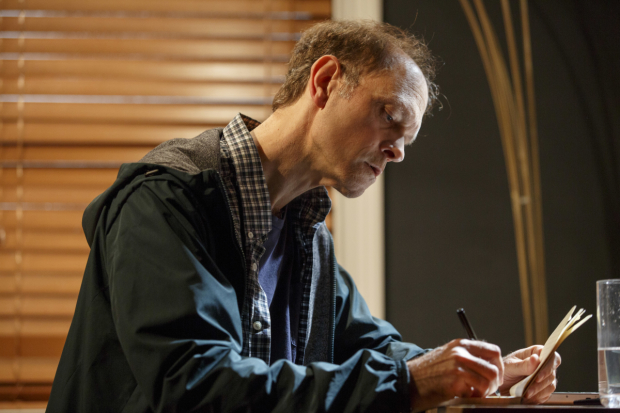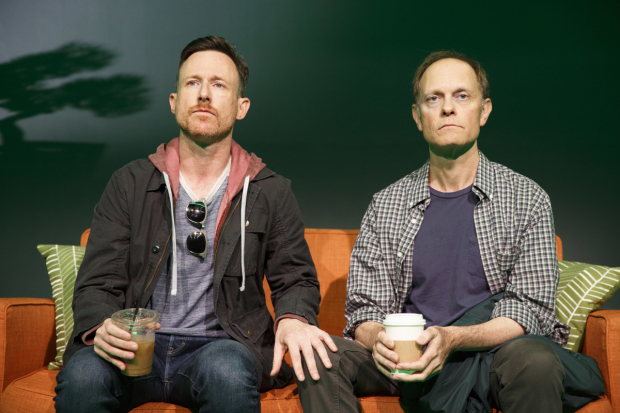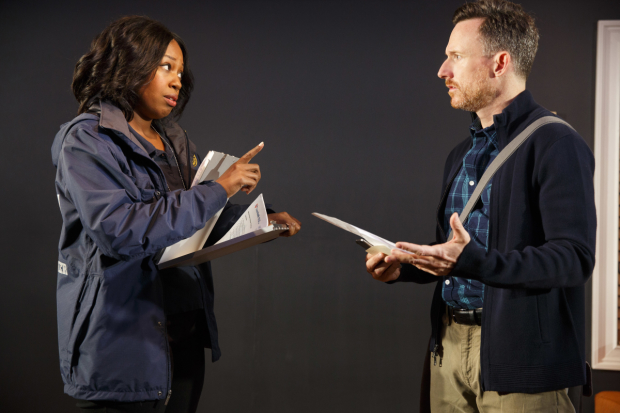A Life

(© Joan Marcus)
Nate likes minimalist furniture, astrology, and the theater. He's a single gay man in his 50s who works as a proofreader for an ad agency and lives alone in New York City. Afraid of both silence and intimacy, he tends to run his mouth, we suspect, just to ward off the terrible silence. His is the life on display in Adam Bock's A Life, which is now making its world premiere at Playwrights Horizons. Nate's journey, as depicted during this quietly unnerving play, is one that can be unequivocally described as universal. It also preys on some of our deepest fears.
Real life is far less predictable than the theater, so Bock leans heavily on the element of surprise to weave his tale, which director Anne Kauffman (Marjorie Prime) successfully exploits to the fullest. She lulls us into a false sense of complacency before completely blindsiding us. It's best not to say more; audiences should really experience this shocking play for themselves.
Bock and Kauffman previously collaborated on The Thugs, a play set in a beige legal office over which an inexplicable terror reigned. A Life exudes a similar combination of horror and the mundane, but this time we understand exactly what is happening onstage as it unfolds. And we cannot help but be completely petrified by the thought of it.

(© Joan Marcus)
Much of this has to do with Tony winner David Hyde Pierce (Curtains), who plays our protagonist with warmth and an affable docility that pulls us into Nate's little world and makes us feel at home there. The entire first scene consists of him sitting in his tidy apartment and speaking directly to the audience. He tells us about his past relationships and gives us a primer on astrology. He regularly consults his chart in an attempt to make sense of his life, although he concedes, "Astrology might be full of sh*t." His best friend, Curtis (Brad Heberlee convincingly playing Nate's best friend), calls during this tiny existential chat and the two men later go out to the park to ogle the passing joggers.
This all sounds fairly quotidian, and it is, which is why the later plot twists are so very upsetting. It also obscures the fact that Pierce gives one of the most physically committed performances I've ever witnessed onstage. We so believe his every movement and lack thereof that it is easy to forget that everything we're seeing is just theater. The other actors (the very funny Marinda Anderson and Nedra McClyde, along with an unexpectedly touching Lynne McCollough) also fully commit, making this an uncomfortably real 90 minutes.
Sound designer Mikhail Fiksel adds to this with an authentic New York City apartment soundscape: People bound up and down stairs in the hallway, a television blares from an adjacent apartment, and a man shouts outside for a neighbor you've never met. When we are allowed to sit for several minutes listening to this soundscape, we begin to understand why Nate is so eager to block it out with the sound of his own voice.
Laura Jellinek's ingenious set not only gives us little clues about Nate's life, but it masks in plain sight some rather big surprises. A late change of scenery is absolutely devastating and makes us feel like the entire world has come untethered, an experience intensified by Matt Frey's disturbing lighting.

(© Joan Marcus)
At the very end, Bock writes a scene that holds out hope for some explanation of what we have just witnessed, only to cruelly rip it away with a flash of light and an incomplete sentence. His commitment to soul-shaking naturalism is reminiscent of Émile Zola at his darkest, conveying a vision of life that is so frightening precisely because we know it to be completely truthful.










